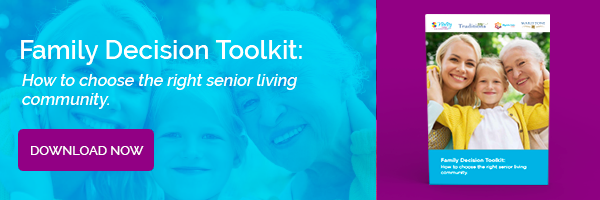In youth, you can’t wait to get older — to get your driver’s license, to vote, to move out and get the independence you’ve longed for. But somewhere along the way, getting older becomes scary. Chances are your parents are dealing with this now. Whether they’ve talked about it or not, you can be sure they’re concerned about the future. So what can you do? Learn what they fear and the best ways to help, right here:
Most Common Aging Fears
We’re living longer than ever today, and that’s a great thing! But is also comes with some legitimate fears. The most common ones for seniors include:
- Loss of independence
- Declining health, particularly memory
- Running out of money
- Having to leave home
- Losing loved ones
- Having to depend on others, especially strangers
- Not being able to drive anymore
- Being isolated and lonely
- Falling or becoming incapacitated
Easing Their Fears
The first thing you can do is to put yourself in their shoes. Realistically, you may very well be in those shoes at some point, so it’s important to take these fears to heart so you and your parent can openly discuss the future together.
Additional ways to help include:
- Show empathy and patience — This provides comfort by proving that you’re on their side and can even strengthen your relationship.
- Give them as much control as possible — Ask how you can help or offer options instead of making decisions for them.
- Help with the budget — Money can be a sensitive topic, but reassuring them of their financial security through a budget is a great way to broach the subject.
- Make safety improvements — Most falls at home can be prevented, so being proactive and removing tripping hazards, adding handrails or grab bars and improving lighting can go a long way.
If your parent’s health is declining or maintaining the house is becoming too much, it may be time for the support of senior living. There will likely be resistance to the idea, but again, involve them in the process, help them understand the positives — peace of mind, active lifestyle, social opportunities, worry-free living to name a few. And give them time; that’s why preplanning is so important. Without a looming crisis your parent has more control to decide what they want and need in the future, and time to adjust to the prospect of moving.
Lastly, let them know you’ll be there. Whether your parent is at home or in senior living, reassure them your relationship won’t change. Make sure to also keep the conversations going so they feel comfortable sharing any worries that may arise.
When Worry Becomes More
When worry becomes so excessive that it begins to negatively affect daily life and/or health, it could be a sign of an anxiety disorder. It’s important to recognize the difference between common anxiety and an anxiety disorder, as The National Institutes of Health states the latter can affect up to 14 percent of people older than 65 years.
If you suspect your parent may have an anxiety disorder, talk with their doctor. There are also lifestyle changes that may help with anxiety, including regular exercise, meditation, relaxation techniques, yoga and even diet changes such as staying hydrated, limiting or avoiding alcohol and caffeine as well as maintaining a balanced diet.
To learn more about senior living, check out our Family Decision Guide!



